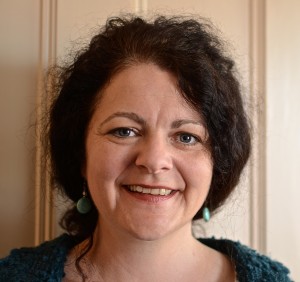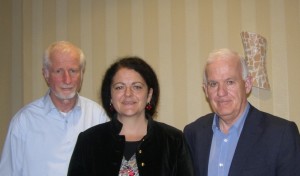‘It depends’, declared professor Siobhan Garrigan of TCD on Saturday October 11th in the Regency Hotel, Dublin – addressing members of the ACI.
She specified four necessary characteristics of a relevant Irish Catholic church of the future: it will be theologically curious, knowledgeable and critical; it will initiate a discussion on what it means to be Irish; it will create a vision of what it means to be truly “Catholic”; and it will develop a vibrant, joyful sacramental life that connects vision with action and mission.
To become theologically educated, access to theology must be improved for all, Professor Garrigan insisted. An undergraduate program in TCD was one step in that direction, but she really prioritized the need for access for ALL. A critical theology will address the question of what is to be done about the wide range of social issues that confronts us. It will also offer access to non-academics in a range of ways. Professor Garrigan asked for feedback on that from the audience, asking whether a theology blog, or other online resources, would be useful. Feedback can be given via her email address in TCD ( garrigs@tcd.ie )
Secondly, a relevant Irish Catholic church will promote a discussion on what it means to be Irish, challenging narrow interpretations that derive from historical Irish nationalism and facing the issue of the growing diversity of Irish society. What about, for example, the children of asylum seekers now growing up in the direct provision system? What of the drug takers on our streets we tend to be ashamed of? What of returned Irish people born abroad? Too often hurtful assumptions can be made in this respect. The Catholic church has huge potential for opening up this question of who is to be included in ‘Irish’.
Thirdly, a relevant church will address the question of what it means to be Catholic – in the sense of being open to the world and to diversity while preserving a core identity that all can share. Open also to the full range of Christian witness, and even to those currents hostile to Christian belief. It is only thinly understood that ‘catholic’ must also mean ecumenical and welcoming of all. We need to recover the inclusivity of the claim ‘catholic’ – and the realisation that Catholic means engaged in the world, as well as prophetic. (Far too few of us know anything much about Catholic social teaching.) To be truly Catholic must also be to be loving and nurturing of all, not just those in need of social justice.
Fourthly, a relevant Irish Catholic church will be sacramentally adventurous and joyful – responsive to the varieties of personality of all it wishes to involve, and aware that all of creation is sacramental. It will be in the sacramental life of the church that participation will become possible for all, and that the social mission of the church will be discovered and developed. It is through liturgy that we become theologians, responsive to the critical needs of our society. Those currently estranged from the sacramental life of the church need to experience something more vibrant, more varied and more sensitive to their needs if they are to become re-involved – and this liturgical renewal mustn’t simply be confined to the Eucharist.
~
There was insufficient time in the Regency for discussion of the wealth of ideas presented in this lecture. The full audio is available from Eist Audio Productions at: http://www.eist.ie/catalog/index.php
In the meantime a discussion can occur here as well, via the ‘Comment’ facility below. N.B. – comments do not need to be confined to Professor Garrigan’s conclusions: everyone needs to have their own ‘take’ on this critical question of what it will take to make our Irish Catholic Church relevant again.



Thank you for this report and thanks to Professor Garrigan for her thought provoking address. If only our church leaders where as encouraging as Professor Garrigan when it comes to people exercising their right and privilege as human beings to ‘do’ theology, which the professor defined beautifully as the study of “what can be said about God”. The approach has been to protect us from theology (or from ourselves). It’s all conveniently done for us. We need only buy the accompanying box-set. This has been evident too in the many voices surrounding the Synod on the Family, reminding us that what can be said about God, (to use Professor Garrigan’s definition), has been said, as the church’s core doctrines are objectively true and unchangeable. For me the only thing that is unchangeable is God, and not our understanding of God. I therefore find it refreshing to hear the German Cardinal, Reinhard Marx saying church doctrine can develop over time. “The core of the Catholic church remains the Gospel, but have we discovered everything?” he asked. “This is what I doubt.” ( http://ncronline.org/news/vatican/cardinal-marx-doctrine-can-develop-change#.VEIkJbYVnrQ.twitter )
I would also agree with Professor Garrigan’s assessment that third level theology is not for everybody, but that a critical mass of laity involved at this level would be transformative. However along with the need for laity to learn the language of church there also needs to be a willingness on the part of church academics to use the language of our lives. An obvious example of the failure to do so showed itself starkly in the weighty questions on ‘natural law’ in the consultation questionnaire leading up to the synod.
I was also please with Professor Garrigan’s emphasis on ecumenism and on the ‘universal’ dimension of catholicism, beyond the mere denominational world we tend to limit ourselves to. As people who dare to call ourselves Catholics, individually and collectively, we should be the epitome of inclusion.
We need a dynamic approach to theology, not the static, fear-filled one that has dominated the church over past decades. This fear has led to the squashing of theological exploration and left the church lagging embarrassingly behind new insights in science, new cosmology and the ever onward progression of human consciousness. Tradition should be the foundation we build on, not the ground we stubbornly sit on. The parables of the talents in Matthew 25 springs to mind. “To those who have, more will be given* and they will grow rich; from anyone who has not, even what they have will be taken away.” (Matt 25:29).
It’s the mysterious relationship of love and knowledge that fascinates me. Just how much theology do we need to be able to love effectively? “Knowledge makes arrogant, but love edifies,” says St Paul – and we all know there can be a complete disconnect between the two. Also I am less impressed by ‘the ever onward progression of human consciousness’ than by the general lack of self-awareness that underlies dysfunctional behaviour. For me the most important insight into this comes not from Catholic theology but from the cultural anthropologist René Girard who has redefined biblical covetousness as mimetic desire – desire that unconsciously mimics the desire of others. That this underlies both consumerism and most violence becomes perfectly clear if you just sit and think about Ireland’s two biggest catastrophes in living memory – the financial crisis of the past decade and the NI Troubles. Ireland’s moneyed meritocracy desired the lifestyle of the West’s super-rich, and the politicos of the two communities in NI are in rivalry (i.e. imitative and competitive desire) for dominance of NI. I would be interested to know what manifestations of ‘the ever onward progression of human consciousness’ so impress Martin, set against this background. Isn’t our human capacity for unconscious self-harm far more striking these times? If the Decalogue was identifying the problem of mimetic desire, and this is not even visible to Catholic moral theology in the 21st century, just how much *moral* (as well as theological and philosophical) progress has humanity made since biblical times?
Sean, I’m not going to pretend to know more than I do, or that I have studied philosophy. I have just my own basic lay man’s understanding of these things. Just to say that what I mean by consciousness is the ability to be aware of self and of existence, its meaning and one’s place in it. I also assume human consciousness, while not unique, to be the most advanced consciousness in the universe (to our knowledge at this point in time), so much so that some would say it is the conscious part of the universe itself. In other words, we have the privilege of being the part of the universe that allows it reflect back on itself. When I talk about the ‘onward progression of human consciousness’ I simply mean that I assume it evolves. If life began 4 billion years ago as single-celled organisms it has certainly moved on a bit since then. And at some stage it developed to a point where what we call human consciousness was achieved. The Genesis story portrays this as the moment Adam and Eve ate the apple, realised that they were naked and ran and hid from God. (Man is the only animal that blushes – Mark Twain). How this consciousness has impacted since on human behaviour (beyond running and hiding in the bushes and being afraid of God), seems to be what you are less than impressed by. You seem to be saying we haven’t moved on that much from there. In other words, we haven’t used our consciousness or our human freedom to respond positively or generously to the gift of life. There is plenty of grounds for pessimism ok but ultimately it is a subjective point. However you may be saying that human consciousness by its very nature is incapable of progress? I tend to go with the idea that it is and that one way or another, we are on an open ended journey towards what we call the Kingdom of God. Was it Martin Luther King who said “The arc of the moral universe is long, but it bends towards justice”.
Thanks for that, Martin. I suppose my problem with ‘evolutionary consciousness’ is that I fear it can play into an ‘aren’t we marvellous’ narcissism – when the spiritual journey needs to be a quest for humility.
That journey does suggest that as individuals we can ‘evolve’ – in the sense of gaining wisdom and insight, usually through some kind of suffering. However, the notion that as a species we are evolving onto ever higher planes of consciousness has something of a ‘New Age’ flavour to it – and might take us more quickly to egotism than to humility. The contrary evidence of continuing and maybe even growing human violence – a violence that derives from the same egotism – ought surely to give us pause here.
I honestly don’t see much point in reminding oneself that one is at the pinnacle of global evolutionary development. Can that help us much anyway, when we are faced with the greatest of life challenges?
As to the Genesis story, I believe it is centrally about the fragility of human self-esteem, and about the relationship between that problem and endless human desire – the root cause of all unhappiness.
However, I am open to further discussion of all this – and wonder what others think.